The Jury System in the UK Criminal Justice System: An Evaluation
VerifiedAdded on 2023/04/21
|6
|2029
|160
Essay
AI Summary
This essay evaluates the jury system within the UK criminal justice system, exploring its advantages and disadvantages. It defines the jury's role, emphasizing its function in evaluating evidence and ensuring public confidence in the judicial process. The essay discusses benefits like jury equity, open justice, and the prevention of bias. However, it also acknowledges disadvantages, such as lengthy trial times, jury tampering, and potential lack of understanding in complex cases. The essay concludes by suggesting the jury system's continued use in serious criminal cases, with recommendations for improvements such as addressing jury tampering and ensuring efficient trial processes. The essay stresses the need for careful consideration in applying the jury system, especially in complex cases where the jury may lack the necessary expertise.

0 | P a g e
Criminology
Criminology
Paraphrase This Document
Need a fresh take? Get an instant paraphrase of this document with our AI Paraphraser
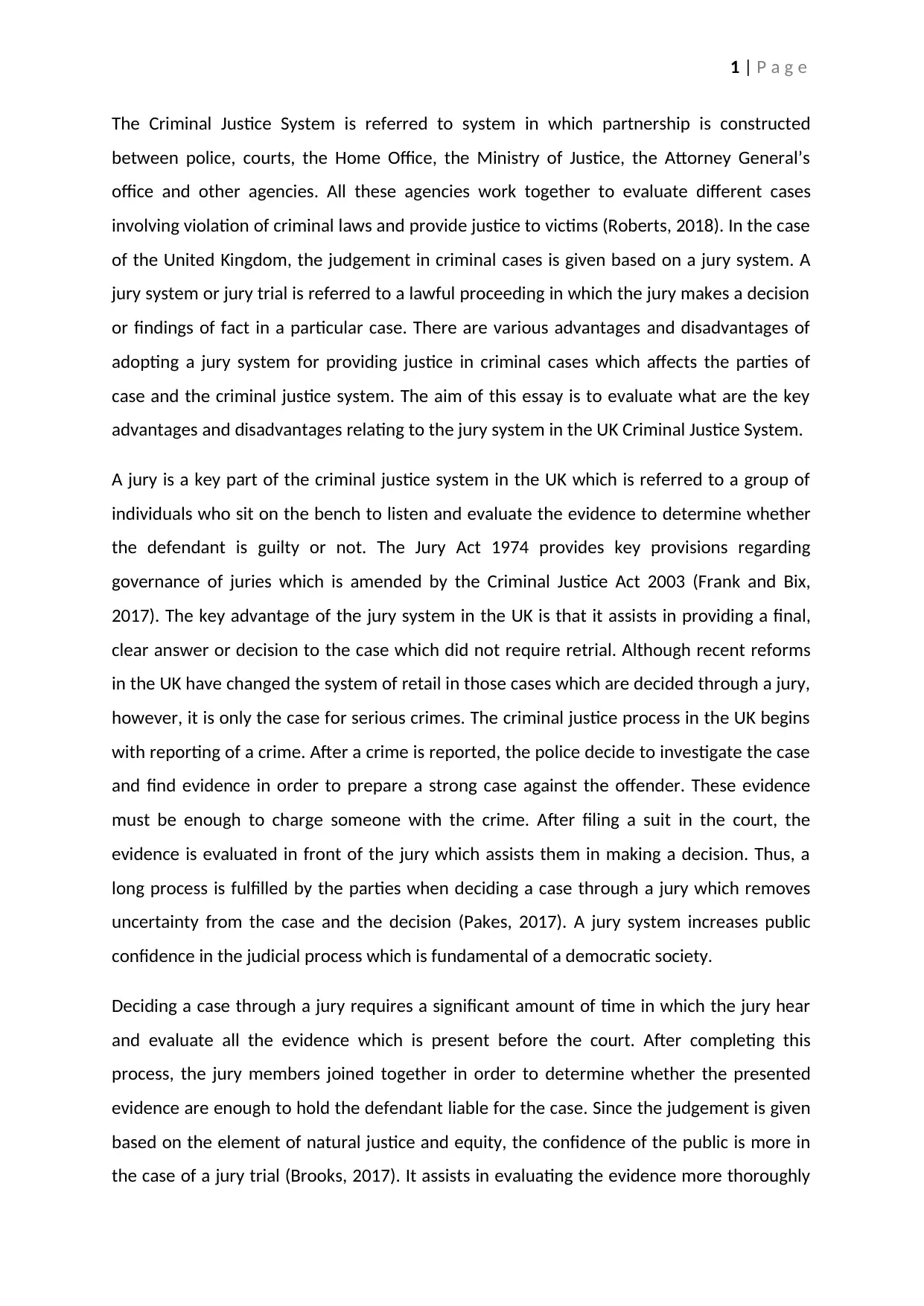
1 | P a g e
The Criminal Justice System is referred to system in which partnership is constructed
between police, courts, the Home Office, the Ministry of Justice, the Attorney General’s
office and other agencies. All these agencies work together to evaluate different cases
involving violation of criminal laws and provide justice to victims (Roberts, 2018). In the case
of the United Kingdom, the judgement in criminal cases is given based on a jury system. A
jury system or jury trial is referred to a lawful proceeding in which the jury makes a decision
or findings of fact in a particular case. There are various advantages and disadvantages of
adopting a jury system for providing justice in criminal cases which affects the parties of
case and the criminal justice system. The aim of this essay is to evaluate what are the key
advantages and disadvantages relating to the jury system in the UK Criminal Justice System.
A jury is a key part of the criminal justice system in the UK which is referred to a group of
individuals who sit on the bench to listen and evaluate the evidence to determine whether
the defendant is guilty or not. The Jury Act 1974 provides key provisions regarding
governance of juries which is amended by the Criminal Justice Act 2003 (Frank and Bix,
2017). The key advantage of the jury system in the UK is that it assists in providing a final,
clear answer or decision to the case which did not require retrial. Although recent reforms
in the UK have changed the system of retail in those cases which are decided through a jury,
however, it is only the case for serious crimes. The criminal justice process in the UK begins
with reporting of a crime. After a crime is reported, the police decide to investigate the case
and find evidence in order to prepare a strong case against the offender. These evidence
must be enough to charge someone with the crime. After filing a suit in the court, the
evidence is evaluated in front of the jury which assists them in making a decision. Thus, a
long process is fulfilled by the parties when deciding a case through a jury which removes
uncertainty from the case and the decision (Pakes, 2017). A jury system increases public
confidence in the judicial process which is fundamental of a democratic society.
Deciding a case through a jury requires a significant amount of time in which the jury hear
and evaluate all the evidence which is present before the court. After completing this
process, the jury members joined together in order to determine whether the presented
evidence are enough to hold the defendant liable for the case. Since the judgement is given
based on the element of natural justice and equity, the confidence of the public is more in
the case of a jury trial (Brooks, 2017). It assists in evaluating the evidence more thoroughly
The Criminal Justice System is referred to system in which partnership is constructed
between police, courts, the Home Office, the Ministry of Justice, the Attorney General’s
office and other agencies. All these agencies work together to evaluate different cases
involving violation of criminal laws and provide justice to victims (Roberts, 2018). In the case
of the United Kingdom, the judgement in criminal cases is given based on a jury system. A
jury system or jury trial is referred to a lawful proceeding in which the jury makes a decision
or findings of fact in a particular case. There are various advantages and disadvantages of
adopting a jury system for providing justice in criminal cases which affects the parties of
case and the criminal justice system. The aim of this essay is to evaluate what are the key
advantages and disadvantages relating to the jury system in the UK Criminal Justice System.
A jury is a key part of the criminal justice system in the UK which is referred to a group of
individuals who sit on the bench to listen and evaluate the evidence to determine whether
the defendant is guilty or not. The Jury Act 1974 provides key provisions regarding
governance of juries which is amended by the Criminal Justice Act 2003 (Frank and Bix,
2017). The key advantage of the jury system in the UK is that it assists in providing a final,
clear answer or decision to the case which did not require retrial. Although recent reforms
in the UK have changed the system of retail in those cases which are decided through a jury,
however, it is only the case for serious crimes. The criminal justice process in the UK begins
with reporting of a crime. After a crime is reported, the police decide to investigate the case
and find evidence in order to prepare a strong case against the offender. These evidence
must be enough to charge someone with the crime. After filing a suit in the court, the
evidence is evaluated in front of the jury which assists them in making a decision. Thus, a
long process is fulfilled by the parties when deciding a case through a jury which removes
uncertainty from the case and the decision (Pakes, 2017). A jury system increases public
confidence in the judicial process which is fundamental of a democratic society.
Deciding a case through a jury requires a significant amount of time in which the jury hear
and evaluate all the evidence which is present before the court. After completing this
process, the jury members joined together in order to determine whether the presented
evidence are enough to hold the defendant liable for the case. Since the judgement is given
based on the element of natural justice and equity, the confidence of the public is more in
the case of a jury trial (Brooks, 2017). It assists in evaluating the evidence more thoroughly
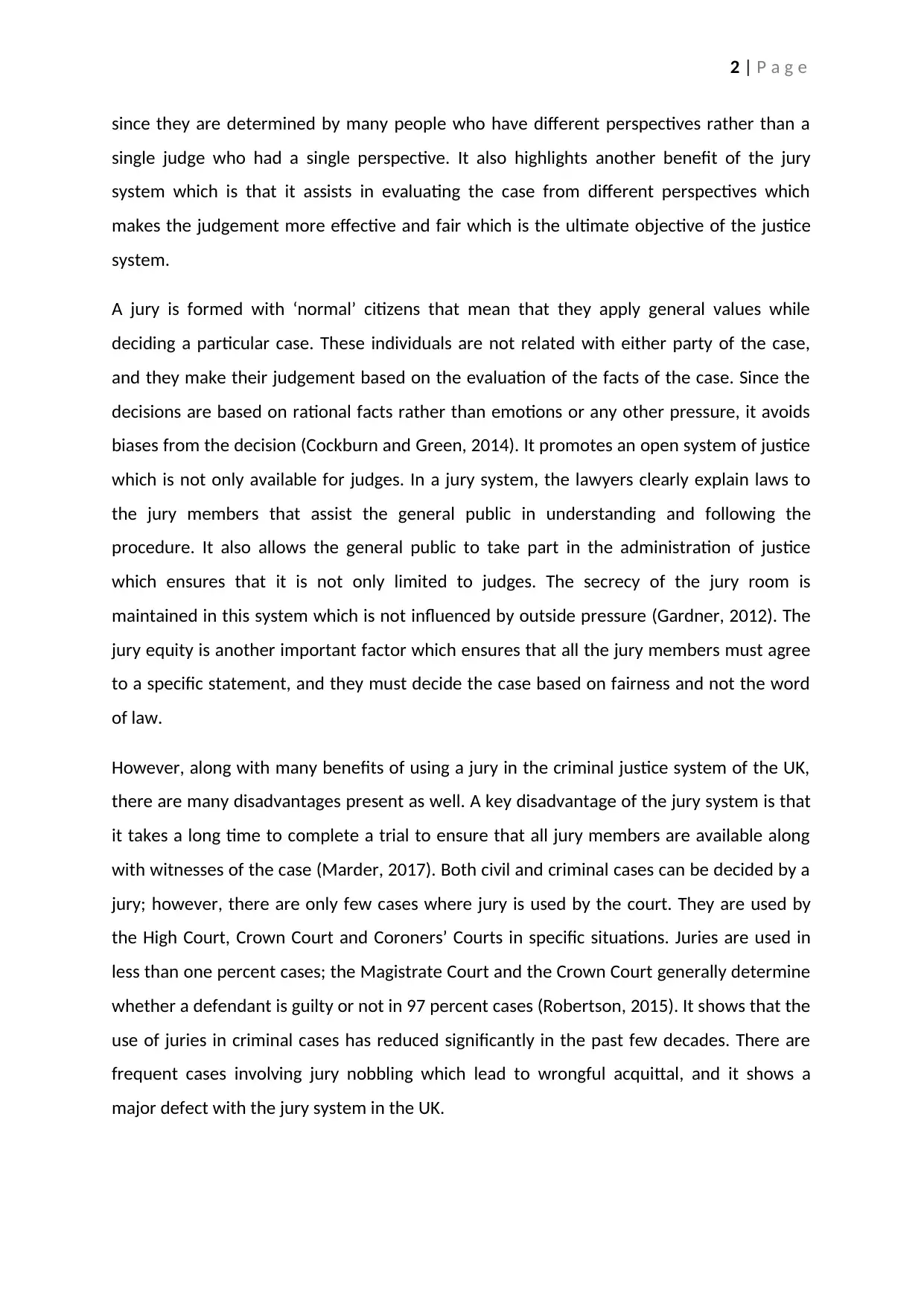
2 | P a g e
since they are determined by many people who have different perspectives rather than a
single judge who had a single perspective. It also highlights another benefit of the jury
system which is that it assists in evaluating the case from different perspectives which
makes the judgement more effective and fair which is the ultimate objective of the justice
system.
A jury is formed with ‘normal’ citizens that mean that they apply general values while
deciding a particular case. These individuals are not related with either party of the case,
and they make their judgement based on the evaluation of the facts of the case. Since the
decisions are based on rational facts rather than emotions or any other pressure, it avoids
biases from the decision (Cockburn and Green, 2014). It promotes an open system of justice
which is not only available for judges. In a jury system, the lawyers clearly explain laws to
the jury members that assist the general public in understanding and following the
procedure. It also allows the general public to take part in the administration of justice
which ensures that it is not only limited to judges. The secrecy of the jury room is
maintained in this system which is not influenced by outside pressure (Gardner, 2012). The
jury equity is another important factor which ensures that all the jury members must agree
to a specific statement, and they must decide the case based on fairness and not the word
of law.
However, along with many benefits of using a jury in the criminal justice system of the UK,
there are many disadvantages present as well. A key disadvantage of the jury system is that
it takes a long time to complete a trial to ensure that all jury members are available along
with witnesses of the case (Marder, 2017). Both civil and criminal cases can be decided by a
jury; however, there are only few cases where jury is used by the court. They are used by
the High Court, Crown Court and Coroners’ Courts in specific situations. Juries are used in
less than one percent cases; the Magistrate Court and the Crown Court generally determine
whether a defendant is guilty or not in 97 percent cases (Robertson, 2015). It shows that the
use of juries in criminal cases has reduced significantly in the past few decades. There are
frequent cases involving jury nobbling which lead to wrongful acquittal, and it shows a
major defect with the jury system in the UK.
since they are determined by many people who have different perspectives rather than a
single judge who had a single perspective. It also highlights another benefit of the jury
system which is that it assists in evaluating the case from different perspectives which
makes the judgement more effective and fair which is the ultimate objective of the justice
system.
A jury is formed with ‘normal’ citizens that mean that they apply general values while
deciding a particular case. These individuals are not related with either party of the case,
and they make their judgement based on the evaluation of the facts of the case. Since the
decisions are based on rational facts rather than emotions or any other pressure, it avoids
biases from the decision (Cockburn and Green, 2014). It promotes an open system of justice
which is not only available for judges. In a jury system, the lawyers clearly explain laws to
the jury members that assist the general public in understanding and following the
procedure. It also allows the general public to take part in the administration of justice
which ensures that it is not only limited to judges. The secrecy of the jury room is
maintained in this system which is not influenced by outside pressure (Gardner, 2012). The
jury equity is another important factor which ensures that all the jury members must agree
to a specific statement, and they must decide the case based on fairness and not the word
of law.
However, along with many benefits of using a jury in the criminal justice system of the UK,
there are many disadvantages present as well. A key disadvantage of the jury system is that
it takes a long time to complete a trial to ensure that all jury members are available along
with witnesses of the case (Marder, 2017). Both civil and criminal cases can be decided by a
jury; however, there are only few cases where jury is used by the court. They are used by
the High Court, Crown Court and Coroners’ Courts in specific situations. Juries are used in
less than one percent cases; the Magistrate Court and the Crown Court generally determine
whether a defendant is guilty or not in 97 percent cases (Robertson, 2015). It shows that the
use of juries in criminal cases has reduced significantly in the past few decades. There are
frequent cases involving jury nobbling which lead to wrongful acquittal, and it shows a
major defect with the jury system in the UK.
⊘ This is a preview!⊘
Do you want full access?
Subscribe today to unlock all pages.

Trusted by 1+ million students worldwide
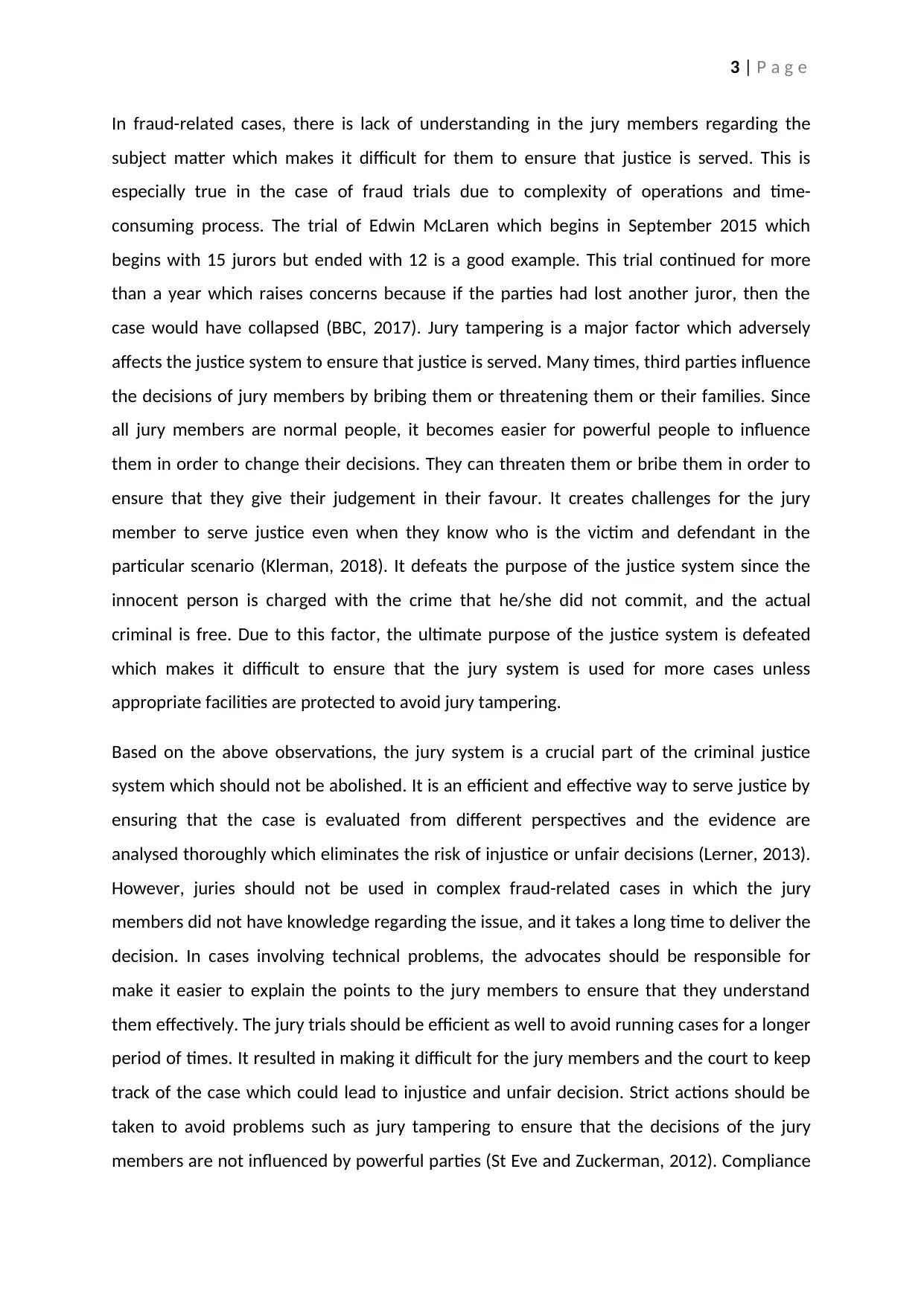
3 | P a g e
In fraud-related cases, there is lack of understanding in the jury members regarding the
subject matter which makes it difficult for them to ensure that justice is served. This is
especially true in the case of fraud trials due to complexity of operations and time-
consuming process. The trial of Edwin McLaren which begins in September 2015 which
begins with 15 jurors but ended with 12 is a good example. This trial continued for more
than a year which raises concerns because if the parties had lost another juror, then the
case would have collapsed (BBC, 2017). Jury tampering is a major factor which adversely
affects the justice system to ensure that justice is served. Many times, third parties influence
the decisions of jury members by bribing them or threatening them or their families. Since
all jury members are normal people, it becomes easier for powerful people to influence
them in order to change their decisions. They can threaten them or bribe them in order to
ensure that they give their judgement in their favour. It creates challenges for the jury
member to serve justice even when they know who is the victim and defendant in the
particular scenario (Klerman, 2018). It defeats the purpose of the justice system since the
innocent person is charged with the crime that he/she did not commit, and the actual
criminal is free. Due to this factor, the ultimate purpose of the justice system is defeated
which makes it difficult to ensure that the jury system is used for more cases unless
appropriate facilities are protected to avoid jury tampering.
Based on the above observations, the jury system is a crucial part of the criminal justice
system which should not be abolished. It is an efficient and effective way to serve justice by
ensuring that the case is evaluated from different perspectives and the evidence are
analysed thoroughly which eliminates the risk of injustice or unfair decisions (Lerner, 2013).
However, juries should not be used in complex fraud-related cases in which the jury
members did not have knowledge regarding the issue, and it takes a long time to deliver the
decision. In cases involving technical problems, the advocates should be responsible for
make it easier to explain the points to the jury members to ensure that they understand
them effectively. The jury trials should be efficient as well to avoid running cases for a longer
period of times. It resulted in making it difficult for the jury members and the court to keep
track of the case which could lead to injustice and unfair decision. Strict actions should be
taken to avoid problems such as jury tampering to ensure that the decisions of the jury
members are not influenced by powerful parties (St Eve and Zuckerman, 2012). Compliance
In fraud-related cases, there is lack of understanding in the jury members regarding the
subject matter which makes it difficult for them to ensure that justice is served. This is
especially true in the case of fraud trials due to complexity of operations and time-
consuming process. The trial of Edwin McLaren which begins in September 2015 which
begins with 15 jurors but ended with 12 is a good example. This trial continued for more
than a year which raises concerns because if the parties had lost another juror, then the
case would have collapsed (BBC, 2017). Jury tampering is a major factor which adversely
affects the justice system to ensure that justice is served. Many times, third parties influence
the decisions of jury members by bribing them or threatening them or their families. Since
all jury members are normal people, it becomes easier for powerful people to influence
them in order to change their decisions. They can threaten them or bribe them in order to
ensure that they give their judgement in their favour. It creates challenges for the jury
member to serve justice even when they know who is the victim and defendant in the
particular scenario (Klerman, 2018). It defeats the purpose of the justice system since the
innocent person is charged with the crime that he/she did not commit, and the actual
criminal is free. Due to this factor, the ultimate purpose of the justice system is defeated
which makes it difficult to ensure that the jury system is used for more cases unless
appropriate facilities are protected to avoid jury tampering.
Based on the above observations, the jury system is a crucial part of the criminal justice
system which should not be abolished. It is an efficient and effective way to serve justice by
ensuring that the case is evaluated from different perspectives and the evidence are
analysed thoroughly which eliminates the risk of injustice or unfair decisions (Lerner, 2013).
However, juries should not be used in complex fraud-related cases in which the jury
members did not have knowledge regarding the issue, and it takes a long time to deliver the
decision. In cases involving technical problems, the advocates should be responsible for
make it easier to explain the points to the jury members to ensure that they understand
them effectively. The jury trials should be efficient as well to avoid running cases for a longer
period of times. It resulted in making it difficult for the jury members and the court to keep
track of the case which could lead to injustice and unfair decision. Strict actions should be
taken to avoid problems such as jury tampering to ensure that the decisions of the jury
members are not influenced by powerful parties (St Eve and Zuckerman, 2012). Compliance
Paraphrase This Document
Need a fresh take? Get an instant paraphrase of this document with our AI Paraphraser
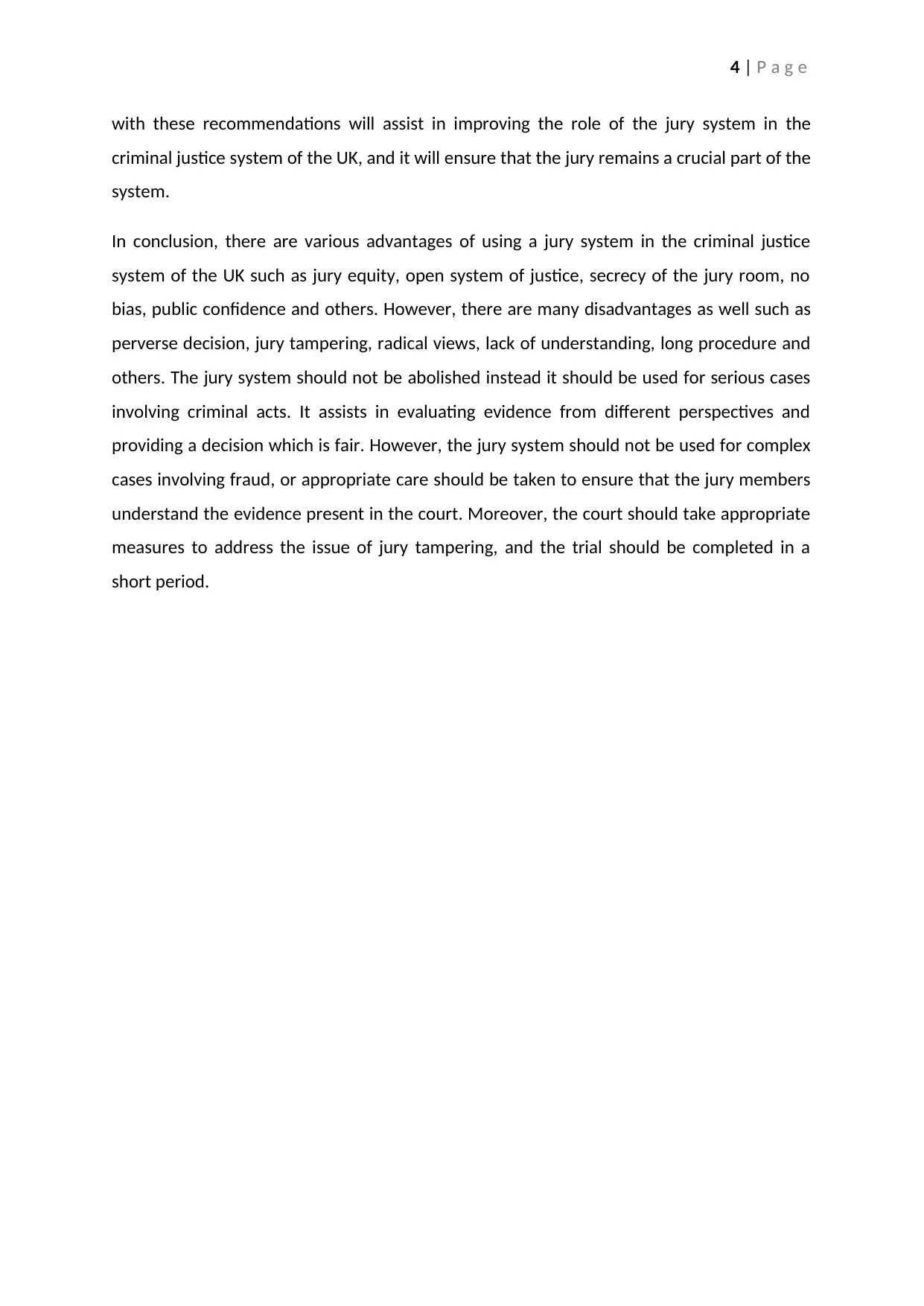
4 | P a g e
with these recommendations will assist in improving the role of the jury system in the
criminal justice system of the UK, and it will ensure that the jury remains a crucial part of the
system.
In conclusion, there are various advantages of using a jury system in the criminal justice
system of the UK such as jury equity, open system of justice, secrecy of the jury room, no
bias, public confidence and others. However, there are many disadvantages as well such as
perverse decision, jury tampering, radical views, lack of understanding, long procedure and
others. The jury system should not be abolished instead it should be used for serious cases
involving criminal acts. It assists in evaluating evidence from different perspectives and
providing a decision which is fair. However, the jury system should not be used for complex
cases involving fraud, or appropriate care should be taken to ensure that the jury members
understand the evidence present in the court. Moreover, the court should take appropriate
measures to address the issue of jury tampering, and the trial should be completed in a
short period.
with these recommendations will assist in improving the role of the jury system in the
criminal justice system of the UK, and it will ensure that the jury remains a crucial part of the
system.
In conclusion, there are various advantages of using a jury system in the criminal justice
system of the UK such as jury equity, open system of justice, secrecy of the jury room, no
bias, public confidence and others. However, there are many disadvantages as well such as
perverse decision, jury tampering, radical views, lack of understanding, long procedure and
others. The jury system should not be abolished instead it should be used for serious cases
involving criminal acts. It assists in evaluating evidence from different perspectives and
providing a decision which is fair. However, the jury system should not be used for complex
cases involving fraud, or appropriate care should be taken to ensure that the jury members
understand the evidence present in the court. Moreover, the court should take appropriate
measures to address the issue of jury tampering, and the trial should be completed in a
short period.
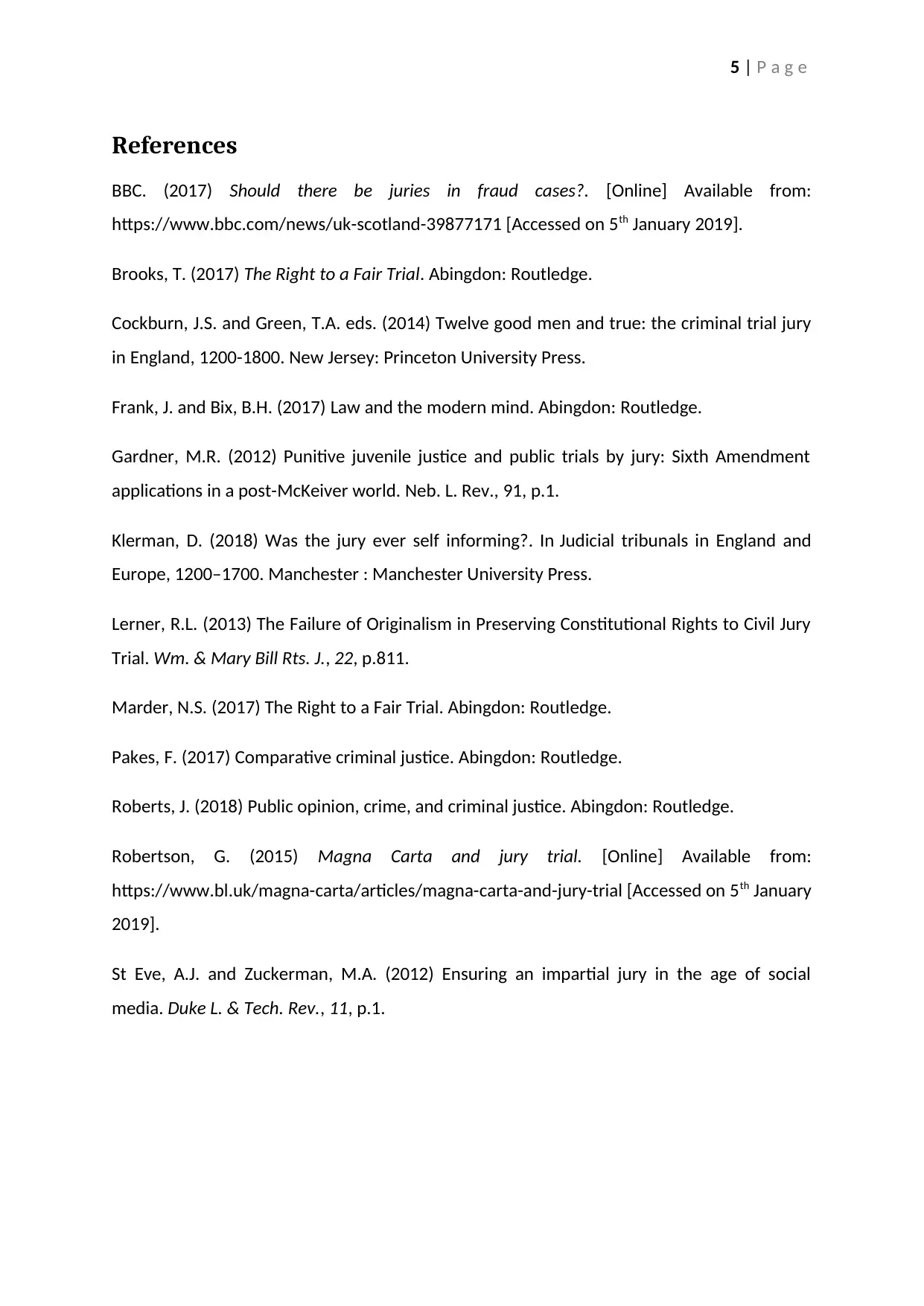
5 | P a g e
References
BBC. (2017) Should there be juries in fraud cases?. [Online] Available from:
https://www.bbc.com/news/uk-scotland-39877171 [Accessed on 5th January 2019].
Brooks, T. (2017) The Right to a Fair Trial. Abingdon: Routledge.
Cockburn, J.S. and Green, T.A. eds. (2014) Twelve good men and true: the criminal trial jury
in England, 1200-1800. New Jersey: Princeton University Press.
Frank, J. and Bix, B.H. (2017) Law and the modern mind. Abingdon: Routledge.
Gardner, M.R. (2012) Punitive juvenile justice and public trials by jury: Sixth Amendment
applications in a post-McKeiver world. Neb. L. Rev., 91, p.1.
Klerman, D. (2018) Was the jury ever self informing?. In Judicial tribunals in England and
Europe, 1200–1700. Manchester : Manchester University Press.
Lerner, R.L. (2013) The Failure of Originalism in Preserving Constitutional Rights to Civil Jury
Trial. Wm. & Mary Bill Rts. J., 22, p.811.
Marder, N.S. (2017) The Right to a Fair Trial. Abingdon: Routledge.
Pakes, F. (2017) Comparative criminal justice. Abingdon: Routledge.
Roberts, J. (2018) Public opinion, crime, and criminal justice. Abingdon: Routledge.
Robertson, G. (2015) Magna Carta and jury trial. [Online] Available from:
https://www.bl.uk/magna-carta/articles/magna-carta-and-jury-trial [Accessed on 5th January
2019].
St Eve, A.J. and Zuckerman, M.A. (2012) Ensuring an impartial jury in the age of social
media. Duke L. & Tech. Rev., 11, p.1.
References
BBC. (2017) Should there be juries in fraud cases?. [Online] Available from:
https://www.bbc.com/news/uk-scotland-39877171 [Accessed on 5th January 2019].
Brooks, T. (2017) The Right to a Fair Trial. Abingdon: Routledge.
Cockburn, J.S. and Green, T.A. eds. (2014) Twelve good men and true: the criminal trial jury
in England, 1200-1800. New Jersey: Princeton University Press.
Frank, J. and Bix, B.H. (2017) Law and the modern mind. Abingdon: Routledge.
Gardner, M.R. (2012) Punitive juvenile justice and public trials by jury: Sixth Amendment
applications in a post-McKeiver world. Neb. L. Rev., 91, p.1.
Klerman, D. (2018) Was the jury ever self informing?. In Judicial tribunals in England and
Europe, 1200–1700. Manchester : Manchester University Press.
Lerner, R.L. (2013) The Failure of Originalism in Preserving Constitutional Rights to Civil Jury
Trial. Wm. & Mary Bill Rts. J., 22, p.811.
Marder, N.S. (2017) The Right to a Fair Trial. Abingdon: Routledge.
Pakes, F. (2017) Comparative criminal justice. Abingdon: Routledge.
Roberts, J. (2018) Public opinion, crime, and criminal justice. Abingdon: Routledge.
Robertson, G. (2015) Magna Carta and jury trial. [Online] Available from:
https://www.bl.uk/magna-carta/articles/magna-carta-and-jury-trial [Accessed on 5th January
2019].
St Eve, A.J. and Zuckerman, M.A. (2012) Ensuring an impartial jury in the age of social
media. Duke L. & Tech. Rev., 11, p.1.
⊘ This is a preview!⊘
Do you want full access?
Subscribe today to unlock all pages.

Trusted by 1+ million students worldwide
1 out of 6
Related Documents
Your All-in-One AI-Powered Toolkit for Academic Success.
+13062052269
info@desklib.com
Available 24*7 on WhatsApp / Email
![[object Object]](/_next/static/media/star-bottom.7253800d.svg)
Unlock your academic potential
Copyright © 2020–2026 A2Z Services. All Rights Reserved. Developed and managed by ZUCOL.





